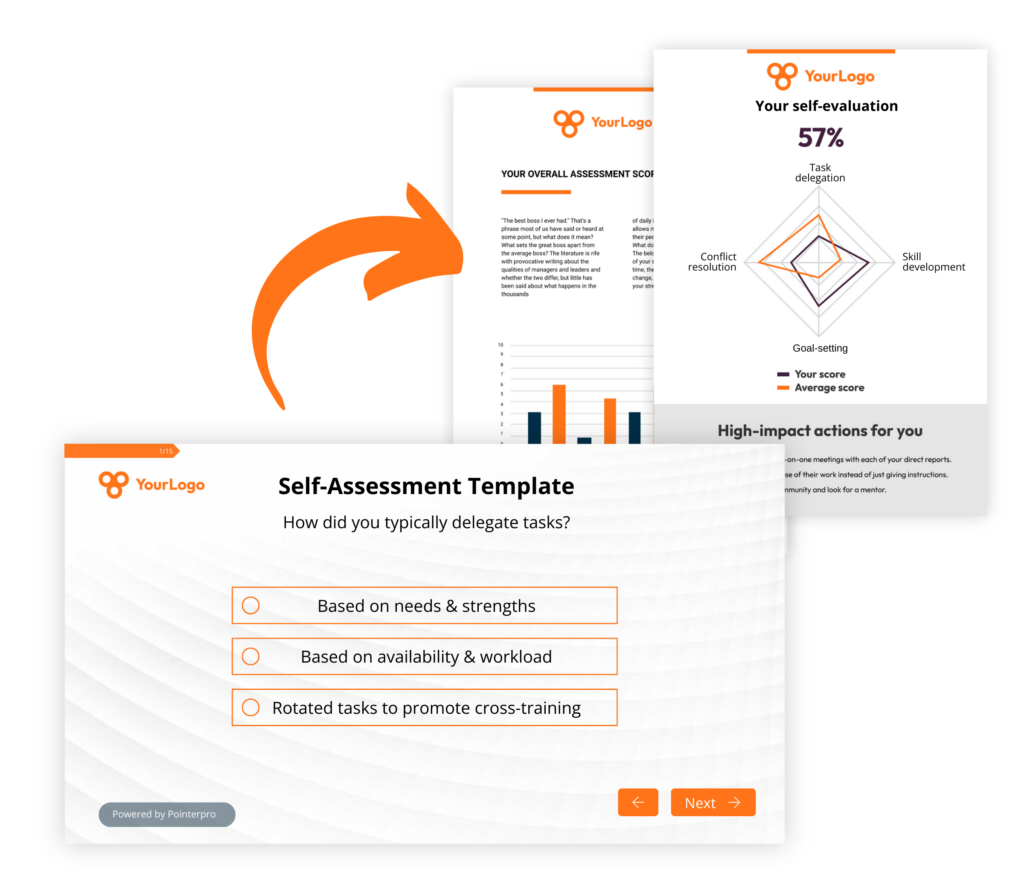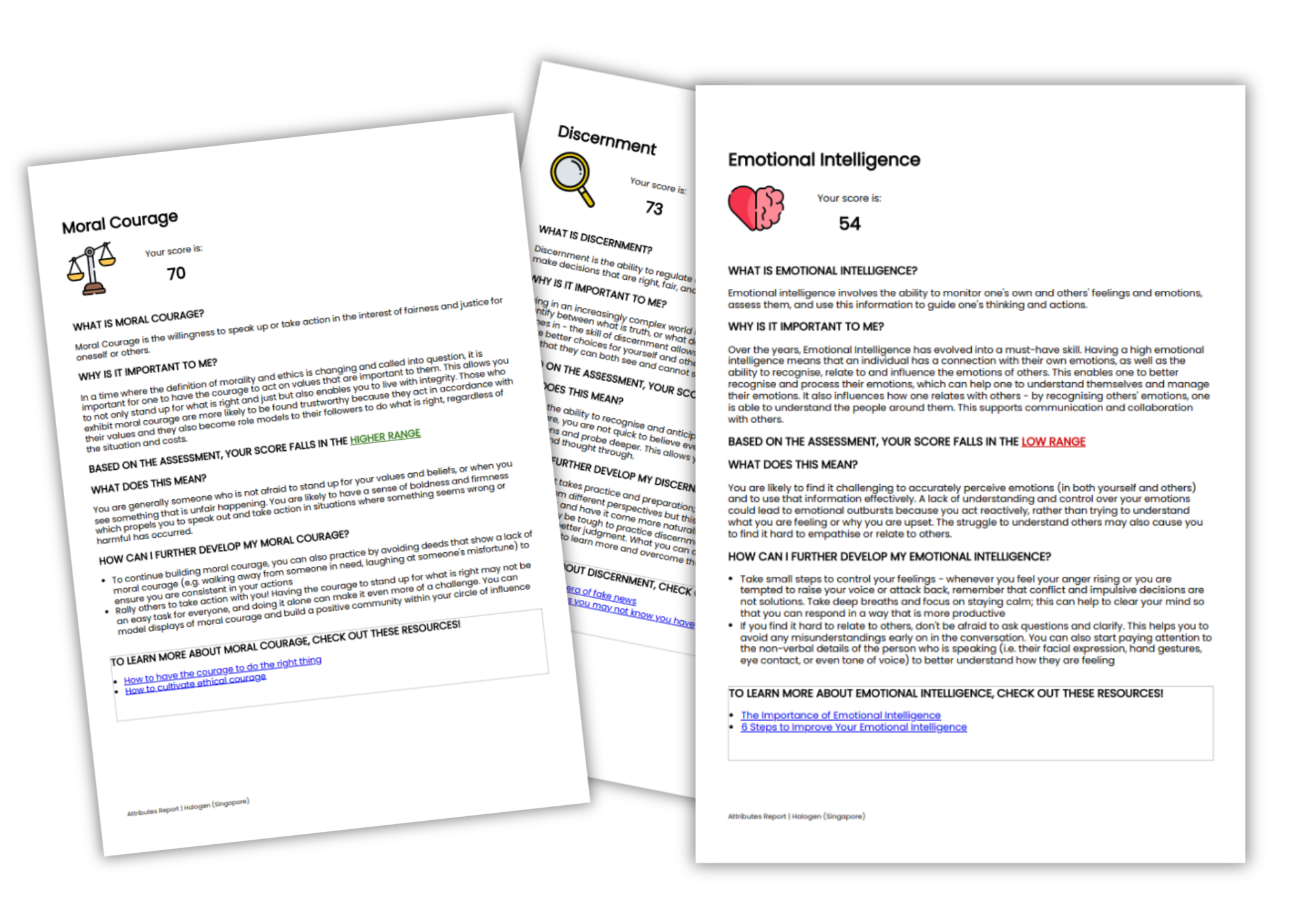Self-assessment template
What if you could build a self-assessment tool to assess and advise anyone, accurately and objectively?
Self-assessments are key to self-awareness, goal-setting and personal development.
Pointerpro is the 2-in-1 software that combines assessment building with personalized PDF report generation.

What is a self-assessment?
A self-assessment is a reflective process where individuals evaluate and analyze their own skills, qualities, performance, and experiences.
A self-assessment template or tool developed for personal and professional development, enabling individuals to gain self-awareness and make informed decisions about their growth and goals. Self-assessments can take various forms, including self-evaluations, questionnaires, or reflective writing exercises.
3 reasons to use Pointerpro as a self-
assessment tool?
Interactive user experience
With the Questionnaire Builder you get to create an engaging assessment. How? With numerous design and layout options, useful widgets and countless question types.
Refined, score-based analysis
Our custom scoring engine helps you quantify different (sub)domains of the self-assessment. The result? An objective and very nuanced assessment of your respondents’ situation.
Automated feedback in PDF
Thanks to your setup in the Report Builder, respondents instantly get a detailed PDF report: with helpful charts, a personalized analysis, and actionable tips.
1.500+ businesses worldwide build assessments with Pointerpro









Why make a self-assessment (and use a self-assessment template)?
Self-assessments play a vital role in the workplace, offering several advantages that complement traditional manager assessments. These self-evaluations allow employees to reflect on their performance and contribute to a more holistic and effective approach to performance appraisal.
One of the primary benefits of self-assessments is the promotion of self-awareness. When employees take the time to assess their own performance, they gain a deeper understanding of their strengths and weaknesses. This self-reflection can lead to personal growth and development as they identify areas for improvement and take ownership of their professional development.
For example, consider a marketing professional who conducts a self-assessment. They may realize that they excel in creating social media content but struggle with data analysis. This awareness can lead them to seek additional training or resources to enhance their analytical skills, ultimately improving their overall performance.
Self-assessments foster employee engagement and motivation. When individuals have the opportunity to express their accomplishments and challenges, it can boost their sense of significance within the organization. This feeling of being heard and valued can lead to increased job satisfaction and productivity. For instance, an employee who feels their self-assessment is genuinely considered by their manager may be more motivated to set and achieve performance goals, ultimately contributing to the success of the team. Moreover, self-assessments promote open communication between employees and managers. They create a platform for constructive dialogue during performance reviews.
Managers can use a self-assessment template as a starting point to discuss employees’ perceptions of their performance, align expectations, and provide feedback. This collaborative approach can strengthen the manager-employee relationship and facilitate a more accurate and fair evaluation.
For example, if an employee rates their teamwork skills highly in their self-assessment, but the manager sees room for improvement, this discrepancy can lead to a productive conversation about expectations and specific areas that need attention.
Additionally, self-assessments can save time and resources. Instead of relying solely on managers to assess every employee, self-assessments distribute some of the evaluation responsibilities. This can be especially valuable in larger organizations, allowing managers to focus on coaching, mentoring, and providing guidance rather than solely on performance evaluations.
By creating a digital self-assessment template, an organization is also able to standardize and make the evaluation process more fluent. Digital formats make it easier to collect and analyze data. Responses are automatically compiled, reducing the risk of errors and making it simple for managers to identify trends or common areas of strength and improvement across teams or the entire organization.
Remember, risk assessment should be tailored to your specific context, and it’s always beneficial to seek input from relevant experts or stakeholders to ensure a comprehensive and accurate assessment.
How do you write a self-assessment (template) for employees?
Writing a good self-assessment for your employees is essential to gather valuable insights into their performance, strengths, and areas for improvement. Here are some steps to help you create an effective self-assessment template for your employees:
- Set clear expectations: Start by outlining the purpose and expectations of the self-assessment. Explain why you're conducting it, how the feedback will be used, and the specific criteria or competencies you want employees to assess themselves on.
- Choose appropriate categories or competencies: Determine the key areas or competencies that are relevant to the employee's role and performance. These might include teamwork, communication, problem-solving, leadership, or job-specific skills. Make sure the categories align with the employee's job description and the organization's goals.
- Use scored questions: You can have employees rate themselves on a numerical scale, or you can provide multiple-choice questions with different answer options to which you attribute a certain score. In your assessment, be sure to provide some help with text guidance so that answer options are interpreted correctly. Using scored questions is what will enable you to analyze response data afterward and identify.
- Also use some open-ended questions: Include open-ended questions that encourage employees to provide more detailed responses. These questions can for instance help employees explain their ratings and provide examples of their achievements, challenges, and areas where they need support.
- Balance strengths and areas for improvement: Include questions that prompt employees to identify their strengths and accomplishments. But also, ask them to recognize areas where they believe they can improve. This balanced approach fosters self-awareness and a growth mindset.
- Encourage goal-setting: In the follow-up report of your self-assessment, ask employees to set specific, measurable, achievable, relevant, and time-bound (SMART) goals based on their self-assessment. This encourages them to think about their development and how they can contribute to the organization's success.
- Consider making the self-assessment anonymous: By making responses confidential You’ll encourage honesty and openness.This is especially worth considering when your key objective is to identify patterns within your teams or organization.
- Provide a deadline: When you distribute it, specify the deadline for completing the self-assessment. This ensures that the process is completed in a timely manner and allows you to plan follow-up discussions.
A well-designed self-assessment template promotes self-awareness, growth, and open communication between managers and employees. It should ultimately lead to more productive discussions and constructive actions for improving performance and achieving organizational objectives.
What is the difference between self-assessment and self-evaluation?
Self-assessments and self-evaluations are both processes through which individual respondents engage in introspection and reflection. Though both are very similar and the terms can be used interchangeably, the two tend to differ in their purpose and scope.
The primary purpose of self-assessment is to gain a comprehensive understanding of one’s strengths, weaknesses, and areas for improvement across various aspects, both personal and professional. Self-evaluation, on the other hand, serves a narrower purpose, primarily focused on assessing one’s performance in a specific role or context against predefined criteria or standards.
50 self-evaluation or self-assessment example questions
Here are 50 of the best self-evaluation assessment example questions divided into 5 categories:
- 10 employee self-assessment example questions
- 10 self-assessment example questions for performance review
- 10 self-assessment example questions for team managers
- 10 self-assessment example questions for HR managers
- 10 career self-assessment questions
10 self-assessment example questions for performance review
- How effectively did you meet your performance goals and targets for the past year?
- What specific accomplishments are you most proud of from the previous year?
- Can you identify any challenges or obstacles you encountered and how you addressed them to meet your objectives?
- Describe how your work contributed to your team's success and the broader goals of the organization.
- What new skills or knowledge did you acquire to enhance your performance or job-related capabilities?
- In what areas do you believe you could further improve your performance or skills?
- How well did you communicate and collaborate with your colleagues, and can you provide examples of effective teamwork?
- Have you achieved the personal and professional development goals you set for yourself last year? If not, what hindered your progress?
- How do you handle feedback and constructive criticism, and what steps have you taken to grow based on this feedback?
- What are your action plans and goals for the upcoming year to enhance your performance and contribute even more to the team and organization?
These self-assessment template questions are designed to facilitate a comprehensive evaluation of an employee’s performance during a performance review. They are more tailored to a formal annual performance review. The list of questions delves deeper into the specifics of accomplishments and skill development, while also focusing on future planning and actionable steps.
10 self-assessment example questions for team managers
- How would you rate your team's overall performance this year?
- How did you typically delegate tasks?
- Which methods did you use for resolving conflicts within your team?
- What best describes your team's culture?
- How did you facilitate skill development within your team?
- Which best describes your approach to setting and achieving team goals?
- How did you provide feedback and support for team members' growth?
- How did you identify and nurture leadership potential within your team?
- How did your team respond to challenges or changes in the work environment?
- What are your key plans for your team's development in the upcoming year?
These concise self-assessment template questions are designed to gather multiple-choice responses from team managers, allowing for quick and quantifiable self-evaluation. The questions cover important aspects of team management, including performance, delegation, conflict resolution, team culture, skill development, goal achievement, feedback, leadership development, adaptability, and future plans. The goal is to assess a team manager’s practices and identify areas for improvement.
10 self-assessment example questions for HR managers
Besides providing self-assessments to team employees and team managers, it is also useful for HR managers to periodically submit themselves to a list of self-assessment questions. Here’s a possible list:
- How effectively did you support the recruitment and onboarding process in the past year, and what were the outcomes of your efforts?
- Describe your contributions to fostering a diverse and inclusive workplace. What initiatives or programs did you lead or participate in to promote diversity and inclusion?
- What improvements or innovations did you introduce to enhance the HR processes or policies, and how did these changes impact the organization?
- Reflect on your conflict resolution and employee relations skills. Can you provide examples of challenging situations you managed and their resolutions?
- How well did you handle employee development and training programs? Were there any notable successes or areas where improvement is needed?
- Discuss your compliance with HR laws and regulations. Can you provide evidence of your efforts to ensure the organization's adherence to employment laws and regulations?
- What feedback mechanisms did you establish to gauge employee satisfaction and engagement? What insights have you gained from employee feedback, and how have you acted on them?
- In what ways did you contribute to talent management and succession planning within the organization? Provide examples of your involvement in identifying and developing top talent.
- Evaluate your performance in managing HR-related challenges or crises. How did you respond to unexpected situations, and what lessons did you learn from them?
- What is your vision for HR in the upcoming year, and what strategies or projects do you plan to implement to support the organization's growth and success?
These self-assessment template questions are designed to assess the performance and contributions of HR managers within the context of their specific HR roles and responsibilities. They focus on areas such as recruitment, diversity and inclusion, process improvement, conflict resolution, employee development, compliance, employee engagement, talent management, crisis management, and future HR strategies. The questions are tailored to evaluate HR managers’ effectiveness in areas crucial to the organization’s overall well-being and development.
10 career self-assessment example questions
Another professional context in which self-assessment is useful, is that of career development. Career consultants and coaches who want to assess their customers could for instance use the following questions in their self-assessment template.
- What are your ultimate career goals, and how do you plan to achieve them?
- What are your key strengths, and how can you leverage them for your career advancement?
- What aspects of your work or industry do you find most fulfilling, and how can you incorporate more of these into your career?
- Which new skills or knowledge do you need to acquire to advance in your current career or explore new opportunities?
- How effective has your networking been in supporting your career growth, and what steps can you take to expand your professional network?
- Reflect on your work-life balance. Are there changes you need to make to maintain a healthy balance while pursuing your career goals?
- What are some key career achievements and milestones you've reached, and what's your plan for the next significant accomplishment?
- How do you actively seek and respond to feedback for continuous self-improvement and career growth?
- Does your current job align with your long-term career aspirations, and if not, what changes can you make to ensure alignment?
- Have you considered seeking mentorship or guidance from experienced professionals to aid your career development? If so, what steps can you take to find a suitable mentor or advisor?
These self-assessment template questions encourage individuals to reflect on their career aspirations, strengths, and areas for improvement, as well as their strategies for skill development, networking, work-life balance, and mentorship. They serve as a framework for setting career goals, identifying action steps, and proactively managing one’s career development.
What Pointerpro clients are saying




In conclusion: Key reasons why self-evaluation is so important
Self-evaluation is important for several reasons, both in personal and professional contexts:
- Self-awareness: Self-evaluation encourages introspection and self-awareness. It allows individuals to gain a deeper understanding of their strengths, weaknesses, values, and aspirations. This self-awareness is the foundation for personal and professional growth.
- Goal setting: Self-evaluation helps individuals set meaningful and realistic goals. By assessing their current state, they can identify areas for improvement and establish clear objectives to work towards.
- Performance improvement: Regular self-evaluation enables individuals to identify areas where they can improve. It fosters a proactive approach to self-improvement, leading to increased effectiveness and productivity.
- Accountability: Self-evaluation promotes accountability. It empowers individuals to take responsibility for their actions, decisions, and outcomes, leading to increased accountability in personal and professional life.
- Feedback integration: It allows individuals to incorporate feedback from themselves and others into their self-improvement efforts. This feedback loop is essential for personal and professional development.
- Decision-making: Self-evaluation aids in making informed decisions. By assessing their values, priorities, and goals, individuals can make decisions that align with their long-term objectives.
- Adaptability: Self-evaluation fosters adaptability. It enables individuals to recognize when changes are needed in response to evolving circumstances, whether in their career, relationships, or personal life.
- Career development: In a professional context, self-evaluation is a critical component of career development. It helps employees identify their strengths and weaknesses, set career goals, and plan their path for advancement.
- Effective communication: Understanding oneself through self-evaluation can lead to more effective communication. It enhances one's ability to express thoughts and feelings and to understand the perspectives of others.
- Emotional intelligence: Self-evaluation contributes to the development of emotional intelligence. It helps individuals recognize and manage their emotions, as well as understand the emotions of others, leading to better interpersonal relationships.
- Personal fulfillment: Ultimately, self-evaluation contributes to personal fulfillment and a sense of purpose. It enables individuals to align their actions with their values and passions, resulting in a more meaningful and satisfying life.
In summary, self-evaluation is a fundamental process that empowers individuals to gain self-awareness, set goals, improve their performance, make informed decisions, and lead more fulfilling lives. It is a valuable tool for personal and professional development, fostering growth and adaptability.
Create your first self-assessment today
You may also be interested in
Recommended reading

Vlerick Business School digitalizes entrepreneurship development with Pointerpro [case study]
What do a top-tier international business school based in the capital of Europe and Pointerpro have in common? At the

Attain Global: How to do psychometric tests right and build a cutting-edge international business [case study]
In many countries worldwide, the pursuit of skillful and engaged employees is not so much a war on talent as

How youth development specialist Halogen reaches thousands of young Singaporeans with Pointerpro [case study]
Singapore, in Southeast Asia, is a global, economic powerhouse with a population of a little less than 6 million people.


